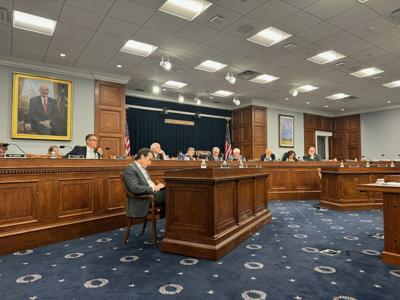WASHINGTON — Rescinding the decades-old Social Security provisions that limit retirement benefits for thousands of Louisiana teachers, police officers and other state and municipal employees — plus millions of similar workers in other states — could cost federal taxpayers billions of dollars, the U.S. House heard Tuesday night.
Retirees, who wanted the Social Security provisions gone, took every seat at the hearing, leaving dozens of seniors standing in the hall unable to enter the room where the House Ways and Means Subcommittee on Social Security took testimony on eliminating the Windfall Elimination Provision, called WEP, and the Government Pension Offset, called GPO.
Overturning the two formulas is the subject of legislation that Garret Graves, R-Baton Rouge, sponsored with Rep. Abigail Spanberger, D-Virginia.
“Louisiana and America’s teachers, firefighters, police and others have been punished for decades for their public service,” Graves said in a statement. More than 300 members of Congress have signed the legislation, called the Social Security Fairness Act.
Social Security benefits are covered by mandatory taxes paid by most employees and employers.
States’ rights constitutional questions prevented the federal government from collecting payroll taxes on state and local government paychecks, so the Social Security Act of 1935 exempted those employees. Over the years, however, more state and local governments asked to be included in Social Security.
WEP and GPO are formulas created to pay retirement benefits to those who worked for employers not covered by Social Security who were later brought into the system.
Workers are more mobile these days, moving between employers, some of whom aren’t required to pay into Social Security. Additionally, the formula impacts the federal Social Security benefits of covered persons whose spouses worked for noncovered employers, such as a state or local government agency.
The way the WEP and GPO formulas work, a well-paid employee in certain situations can receive a windfall even as lower-income employees are penalized.
“The glitches and inequities that would arise in Social Security in the absence of the WEP/GPO are not victimless phenomena,” said Charles Blahous, a research strategist at George Mason University in Fairfax, Virginia.
Roughly 6 million of the nation’s approximately 22 million state and local government employees — about 27% — do not pay into the Social Security system. About 2.1 million Social Security beneficiaries — or around 3% — were affected by the WEP as of December 2023, while approximately 746,000 beneficiaries, or less than 1%, were affected by the GPO.
Graves and Spanberger are pressing the House to prepare the legislation for a floor vote in the lower chamber. But nothing has been done yet.
Eliminating both provisions would cost about $183 billion to repeal, testified Rachel Greszler, a visiting fellow in the Workforce, Economic Policy Innovation Center. She added that policymakers should implement a "fair and accurate fix” as Congress addresses Social Security’s $22.4 trillion shortfall and imminent insolvency.
Connecticut Rep. John Larson, the highest-ranking Democrat on the panel, said Congress hasn’t upgraded Social Security for 50 years and now the entitlement is running out of money.
“There’s never any mention of how the reforms will be paid for. I support the intent to repeal," Larson said. “We have simply not met our responsibility.”
Larson is sponsoring legislation that would raise payroll taxes on the wealthiest workers to cover the Social Security shortfalls.
U.S. Sen. Bill Cassidy, a Baton Rouge Republican, is sponsoring legislation that would invest in financial markets, like private pension funds do.
“The big issue is how you pay for reform,” Cassidy said Wednesday in a separate interview.

